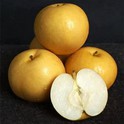As a supplier of yellow pears, I've always been intrigued by the various aspects of these delightful fruits. One question that often comes up, both from consumers and fellow industry players, is about the pH level of yellow pears. Understanding the pH level is not only crucial for those with specific dietary needs but also for food processing and preservation. In this blog post, I'll delve into the pH level of yellow pears, explore the factors that influence it, and discuss its implications.
What is pH?
Before we jump into the pH level of yellow pears, let's quickly review what pH is. pH is a measure of the acidity or alkalinity of a solution. It ranges from 0 to 14, with 7 being neutral. A pH value below 7 indicates acidity, while a value above 7 indicates alkalinity. The lower the pH value, the more acidic the solution; the higher the pH value, the more alkaline it is.
The pH Level of Yellow Pears
Yellow pears, like many other fruits, are generally acidic. The pH level of yellow pears typically ranges from 3.5 to 4.5. This acidity is due to the presence of various organic acids, such as malic acid and citric acid. Malic acid is one of the most abundant acids in pears and contributes to their characteristic tartness. Citric acid, on the other hand, is also present in smaller amounts and adds to the overall acidity of the fruit.

The specific pH level of a yellow pear can vary depending on several factors, including the variety of the pear, its ripeness, and growing conditions. For example, the Crown Juicy Pear may have a slightly different pH level compared to the Ornamental Pear or the Golden Pear Fruit. Generally, as pears ripen, their pH level tends to increase slightly, becoming less acidic. This is because the organic acids are gradually broken down during the ripening process.
Factors Affecting the pH Level of Yellow Pears
Variety
Different varieties of yellow pears have different genetic makeup, which can result in variations in their chemical composition, including the amount and type of acids present. Some varieties may naturally have a higher acid content, leading to a lower pH level, while others may be less acidic. For instance, certain heirloom varieties of yellow pears may have a more pronounced tartness due to a higher concentration of malic acid.

Ripeness
As mentioned earlier, the ripeness of a yellow pear has a significant impact on its pH level. When pears are unripe, they are usually more acidic. As they ripen, enzymes break down the organic acids, causing the pH level to rise. This is why unripe pears often taste more tart, while ripe pears have a sweeter and more balanced flavor.
Growing Conditions
The environment in which yellow pears are grown can also affect their pH level. Factors such as soil type, climate, and the use of fertilizers and pesticides can all influence the chemical composition of the fruit. For example, pears grown in soil with a high pH level may have a slightly higher pH themselves. Similarly, excessive use of certain fertilizers can alter the acid-base balance in the fruit.
Implications of the pH Level of Yellow Pears
Dietary Considerations
The pH level of yellow pears can be important for people with certain dietary restrictions or health conditions. For individuals with acid reflux or sensitive stomachs, the relatively acidic nature of yellow pears may cause discomfort. On the other hand, the acidity of pears can also aid in digestion by stimulating the production of digestive juices. Additionally, the antioxidants and dietary fiber in yellow pears make them a healthy addition to a balanced diet.
Food Processing and Preservation
In the food industry, the pH level of yellow pears is a crucial factor in processing and preservation. The acidity of pears helps to inhibit the growth of harmful bacteria and fungi, making them suitable for canning, jamming, and other preservation methods. For example, when making pear jam, the natural acidity of the fruit helps to set the jam and prevent spoilage. The pH level also affects the flavor and texture of processed pear products.
Quality Control and pH Testing
As a yellow pear supplier, ensuring the quality of our products is of utmost importance. One way we do this is by regularly testing the pH level of our pears. We use a pH meter, which is a simple and accurate device for measuring the pH of a solution. By monitoring the pH level, we can ensure that our pears meet the desired standards of acidity and flavor.
We also conduct sensory evaluations to assess the overall quality of our pears, including their taste, texture, and appearance. This combination of pH testing and sensory evaluation allows us to provide our customers with high-quality yellow pears that are both delicious and safe to consume.
Conclusion
In conclusion, the pH level of yellow pears typically ranges from 3.5 to 4.5, making them moderately acidic. This acidity is due to the presence of organic acids such as malic acid and citric acid. The pH level can vary depending on factors such as variety, ripeness, and growing conditions. Understanding the pH level of yellow pears is important for dietary considerations, food processing, and quality control.
If you're interested in purchasing high-quality yellow pears for your business or personal use, I invite you to contact me for a procurement discussion. We offer a wide range of yellow pear varieties, including the Crown Juicy Pear, Ornamental Pear, and Golden Pear Fruit. Let's work together to meet your pear needs!
References
- Kader, A. A. (2002). Postharvest technology of horticultural crops. University of California, Division of Agriculture and Natural Resources.
- Watada, A. E., Abbott, J. A., & Wang, C. Y. (1996). Respiration and ethylene production. In Postharvest physiology and pathology of vegetables (pp. 25-42). CRC Press.
- USDA National Nutrient Database for Standard Reference. (2023). Available at: https://fdc.nal.usda.gov/





